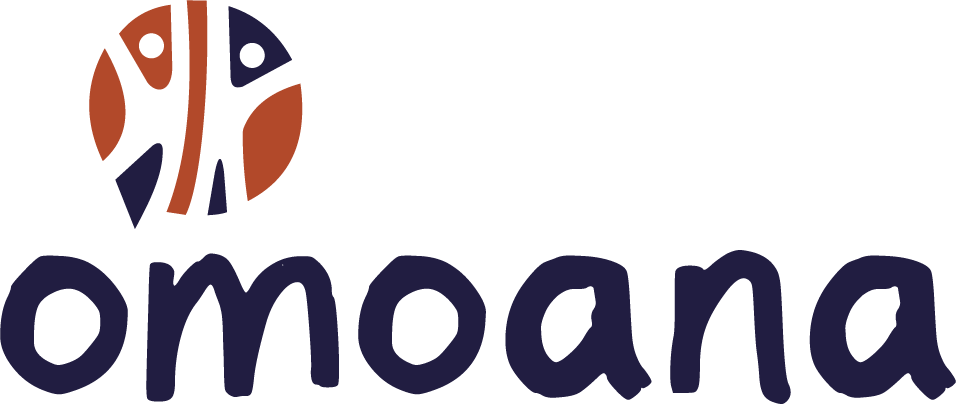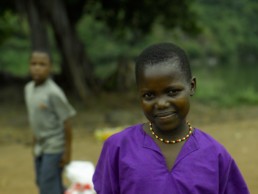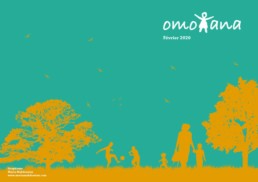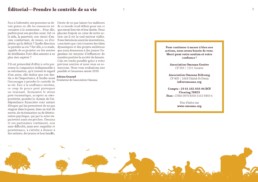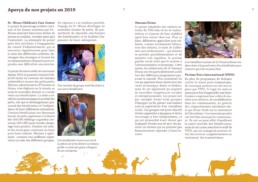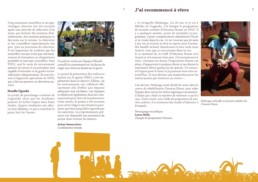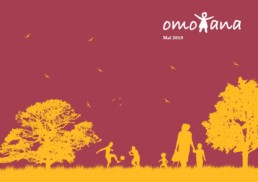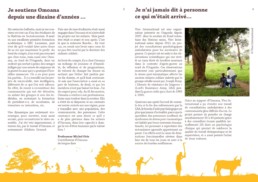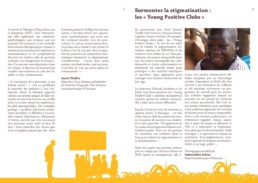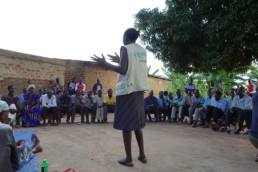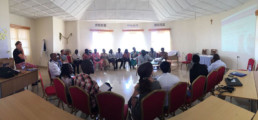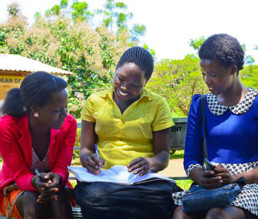Combating gender-based violence: getting men involved
Since January 2018, with the support of Omoana, Handle Uganda has been implementing a project to prevent gender-based violence. This helps to foster a family dynamic that is conducive to children’s well-being. Here is a description…
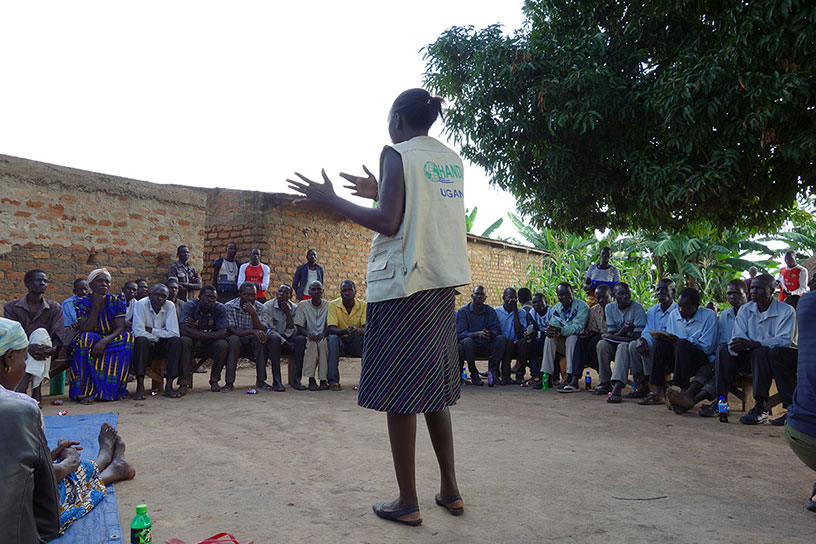
HANDLE Uganda is a small local NGO based in Gulu, northern Uganda, a region still coping with the devastating consequences of a twenty-year civil war. The organization has begun a three-year project in the Nwoya district to combat gender-based violence (GBV), which was widespread in northern Uganda during and after the conflict. This ambitious project is developing a multi-dimensional, holistic approach to tackling GBV at individual, family, community and local government levels.
In addition to various types of physical violence, GBV also takes the form of unequal access to land ownership and to different means of production and sources of income. To remedy this situation, HANDLE promotes women’s rights and equality with men by providing 300 women living in poverty with support in setting up village savings and credit associations (AVEC) to boost their financial literacy. In addition, the organization provides training and support in the creation and management of micro-enterprises.
The aim is to strengthen women’s financial independence in relation to men, so that they can become more autonomous and move towards a position of parity.
These women are also informed about their rights and what defines GBV, so that they can recognize the various forms of discrimination and violations against them. They receive information on what they can do if they or women around them are victims of GBV. They are also provided with the resources they need to access legal and medical services. To this end, HANDLE has a legal representative who supports victims by directing them to the appropriate services for the most serious cases, and by providing a mediation service for families in cases of marital disputes.
HANDLE also provides support in the event of land disputes, to limit the dramatic turn these often take. A mediation service is available to families and communities affected by such problems, as well as legal support if required. While denial of access to property is in itself an infringement of women’s rights, it often degenerates into physical violence, particularly in a population still traumatized by civil war. It is therefore important not to overlook this issue.
With men too…
The project is not limited to women, however. HANDLE also trains groups of male role models, made up of men of varying levels of influence and social background, from farmers to Rwotkweris (clan leaders). Three groups of thirty men each receive intensive training to act as vectors of change within their villages and communities. They learn about GBV, women’s rights and what they can do to influence and educate members of their community.
Each man is a role model for his family and neighbors, and works intensively with ten families in conflict situations, with a particular focus on GBV. The role models also receive basic training in counseling and conflict management in cases of GBV. They are also provided with bicycles to help them carry out their community mobilization and mediation duties.
HANDLE also works closely with local government, police and other stakeholders to strengthen its initiatives. In conjunction with the relevant authorities, the organization carries out important community awareness-raising work through cultural events. On these occasions, the various leaders speak out against GBV and inform their communities of its harmful consequences. Police forces, for their part, are trained on how to recognize cases of GBV and report the crimes committed, as well as on the importance of reporting cases as quickly as possible and preserving evidence, especially in cases of sexual violence.
HANDLE is looking forward to working with various partners and beneficiaries to improve the quality of life of women, men and children in their communities and help reduce GBV in the region.
Emma McGeachy
A network of peace promoters in Africa's Great Lakes region
With the support of the Fédération Genevoise de Coopération (FGC), Omoana and Eirene Suisse set up a workshop to share different practices for people traumatised by war in the Democratic Republic of Congo (DRC), Rwanda and Uganda. Read the story.
The regional partners of Eirene Switzerland and Omoana met for 6 days in the town of Huye, around a hundred kilometres south of the Rwandan capital Kigali. Some of the 25 participants came from Uganda (Handle, ACOT and Vivo, Omoana), others were almost at home (the Rwandan associations Réseau des femmes, Umuseke and Association Modeste et Innocent), while the representatives of Pole Insitute came from the Democratic Republic of Congo. Omoana coordinator Magali Perrin and committee member Sophie Grangier were also present.
Taï Chi and meditation
The ambition of this workshop was big: to bring together organisations from different countries to share their working methods, even though the participants do not speak the same language. Nonetheless, these organisations share a common objective, each working in their own region and in their own way to support traumatised people. Ugandan NGOs use psychology to help people affected by the country’s conflicts to rebuild their lives. Rwandan NGOs use social therapy to help reconcile communities that collapsed during the genocide.
Despite language barriers, participants were skilfully encouraged to mix. Exchanges between English-speakers and French-speakers flourished, despite a timid start in which participants were divided into two groups, with the “pro-Molière” and “pro-Shakespeare” groups on one side. After a while, some people spontaneously got together at dawn to organise Tai Chi and meditation sessions. The participants discovered the discussion groups in which genocide survivors and former genocidaires meet to discuss and help each other. This is a relatively common occurrence, particularly in the context of compensation payments to be made by former prisoners to their victims, one of the components of the national reconciliation process.
Future cooperation
The final day of the gathering was devoted to a visit to the social therapy project set up by the Association Modeste et Innocent since 2013 with the support of Eirene. The participants and beneficiaries of the social therapy were divided into small groups to share their life stories. During these discussions, the participants were able to see the extent of the work accomplished by Noëlla, Médiatrice and Gilbert, the AMI facilitators. In one of the groups, two neighbours explained their different experiences during the genocide. One lost part of his family to the other. However, thanks to dialogue and exchange, they now meet regularly in discussion groups, enabling them to move beyond the unspeakable.
The participants were impressed by the work they had done and were keen to apply it at home. This had a particular resonance for one participant from the DRC, who deplored the lack of effort in his country to work towards a process of reconciliation. As is often the case in Rwanda, the visit ended with an impromptu party during which the participants danced to Rwandan rhythms and discovered the region’s culinary specialities.
On the day of departure, the participants spontaneously exchanged their contact details. Following a final exchange “Marketplace” exercise, the participants shared the methods that interested them in the other. A few months after the end of this workshop, there are already collaborations between organisations that wish to send one of their leaders on an immersion visit to the other structure, but also pooling of strengths in order to build more ambitious projects. By bringing together our partners in the Great Lakes region, with the financial support of the Fédération Genevoise de Coopération, we are strengthening the work carried out by these organisations and facilitating the dissemination of effective local practices.
Bastien Morard
Great Lakes Programme Manager
Eirene Suisse
The right to education: a reality?
Some children from particularly deprived families would not be able to continue their education without outside help. Because their families are unable to pay for their education, they are forced to drop out of school for lack of resources, and like so many others, have to make do with a hand-to-mouth existence. However, school sponsorship projects are there to support and accompany families in need, not to replace them.
Omoana works in partnership with 2 separate associations which implement the school sponsorship projects. The first partnership began in 2003, in the south of the country, with St Moses CCC (St Moses Children’s Care Center and Community Development), founded in 1973 as a center for abandoned, destitute and displaced children. It currently sponsors a total of 163 children, 66 of them through Omoana. Where necessary, the center provides accommodation for some of the children. Activities include counseling, guidance and psychological support, as well as medical follow-up. Emphasis is placed on the development of social skills and Christian education for all children, whether resident or not. Finally, the association ensures the payment of school fees and the follow-up of pupils. Community and sustainable family development is promoted through training, follow-up and support via a microfinance project.
A second sponsorship project was set up in the north, in the post-conflict region of Gulu, in 2009. It is currently managed by HANDLE Uganda (Hope Alert Network for Development and Local Empowerment), an NGO founded in 2009 to fill gaps in service provision to communities undergoing rehabilitation and reconstruction. The project supports 29 students at various levels of education, from primary to vocational schools and university. Activities are broadly similar to those at St Moses, with the exception of the residents’ center. Team members are based in the city of Gulu and travel to follow up students. They visit families to discuss day-to-day issues, and understand the context in which the wards live. They also visit teaching centers to pay school fees and review progress with teachers.
There are many issues at stake, particularly school drop-out and failure. Some parents don’t play their part in the equation, for financial reasons or because they’ve resigned. As a result, the boundary between the involvement of project teams and the role of families is difficult to define. Families pay part of the school fees, but can we ignore a child who can’t study for lack of basic school equipment? At the same time, expectations, whether justified or not, are sometimes very high, and some parents rely completely on the associations to manage the difficulties.
The project teams must create a climate of trust that encourages dialogue with the pupils and their families; they must listen to everyone’s difficulties and find solutions on a case-by-case basis: who needs to change to a vocational school because of academic difficulties, who needs to leave the program because of breaches of trust, who needs to go to boarding school to escape the overload of housework that prevents study or to have access to a better quality school, etc.?
It’s worth noting that in Uganda, children take on a lot of responsibility at a very early age, especially girls. They are in charge of domestic chores – fetching water from the well, cooking, cleaning – and at the same time looking after younger children or sick relatives. These obligations are not going to diminish because they have to study. And then there are the girl mothers with no husbands and no resources, the onset of adolescence, the sometimes enormous distances involved in getting to school, to name just a few of the many problems.
To top it all off, the quality of the public school system in Uganda is a real problem, especially in remote areas, and the cost of schooling continues to rise as a result of inflation and the government’s limited involvement in its development.
My intention is not to paint a gloomy picture of the situation, but rather to highlight the infinite number of peculiarities facing the staff engaged in this work.
In conclusion, given the growing number of children in need, the means deployed to help these families are not enough. By enabling a child to attend a normal school and pursue a secondary education, you are offering him the chance to build a real future for himself, and to participate in the development of his country in the future. And he thanks you most sincerely.
Magali Perrin
Coordinator
